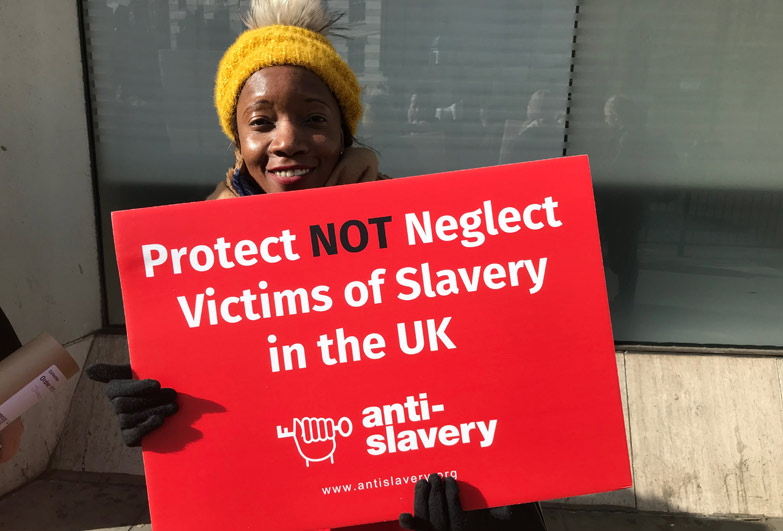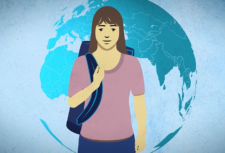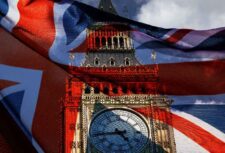Disclaimer: This article is more than 4 years old, and may not include the most up-to-date information or statistics. Please verify information with more recent sources as needed, and if you have any questions contact our Press Office.
What we’re calling the next UK government to do after the election

7 November 2019
Slavery still exists, and children and adults are trapped in slavery on our doorsteps here in the UK. 6,993 people were identified as possible victims of trafficking in 2018 alone, including 3,137 children. Around the world an estimated 40 million people are enslaved.
In 2015 the UK Government passed the Modern Slavery Act to tackle modern slavery at home and called upon on other nations to work together to address this scourge. We are calling on the next Government to continue this high-level commitment to put an end to slavery globally.
Anti-Slavery International has been working to end slavery for 180 years and has an in-depth knowledge of what works. We therefore urge the new UK Government to take the following actions to solve modern slavery.
TAKE ACTION: Share our manifesto with friends and family and email or speak to your local election candidates and ask them to support our manifesto requests.
Tackling and preventing slavery
The UK lacks a coherent prevention strategy and although the number of people identified as possible trafficking victims rises year on year, prosecution rates remain low.
In industries where slavery is rife, exploitative practices continue unchecked. Doctors, teachers or social workers need to be supported to spot the signs of slavery early and prevent further exploitation, especially in the case of children coerced into ‘county lines’ practice, but services often lack the capacity to do so.
Victims of slavery with irregular immigration status are often too scared to come forward to the authorities. Identification as trafficked does not necessarily lead to permission to work and people can be left in limbo for years as they wait for trafficking and immigration decisions. Often in debt to traffickers, or with dependent family members reliant on remittances, they are vulnerable to re-trafficking.
The next Government should:
- Increase the capacity of the police and prosecutors to carry out complex trafficking investigations and bring perpetrators to justice, including continuing information sharing and joint work with counterparts in Europe.
- Increase workplace inspections, particularly in the most vulnerable sectors, to ensure exploitative practices and slavery are spotted early. There must be a clear firewall between workplace inspections and immigration enforcement.
- Invest resources in frontline services to increase their capacity to spot the signs of slavery early and prevent further exploitation.
- Grant all non-UK national survivors 3 years residence and work permit, so they can rebuild their lives and contribute their skills and knowledge to society.
Support Survivors
Responsibility for preventing, identifying and supporting victims of slavery currently rests with the Home Office. There are challenges with this approach which mixes victim identification and care with immigration enforcement priorities and can result in victims being treated as if they are criminals.
The next Government should:
- Locate responsibility for the identification and coordination of care for victims of slavery in a government department better equipped to support them, such as the Department of Health and Social Care.
- Make sure care and recovery is tailored to the individual needs of survivors at every stage of their recovery and is not limited by arbitrary time frames.
Slavery and Brexit
- In the event of Brexit, introduce primary legislation, prior to exiting, which transposes the rights of victims to support and assistance, as detailed in the EU Trafficking Directive 2011, into domestic law.
- Ensure effective co-operation and information sharing with European criminal and justice networks and institutions.
- Take measures to protect all workers’ rights, including European nationals, so people can challenge and leave exploitative jobs in the UK without affecting their immigration status.
- Ensure work permit and visa arrangements do not make migrants more vulnerable to being exploited, for example visas which tie people to a named employer so increasing the likelihood of exploitation.
Business and Trade
- Strengthen the Modern Slavery Act, including by introducing meaningful sanctions on companies that fail to comply and publicly disclosing in the public domain a list of non-compliant businesses.
- Go beyond reporting requirements, by introducing a new law mandating UK companies to take action to prevent human rights abuses in their global operations and supply chains.
Taking an International Lead
The next Government should ensure the UK continues to lead global efforts to end slavery internationally by:
- Making sure slavery remains a foreign and international development policy priority.
- Work to achieve the Sustainable Development Goal 8.7 on ending child labour.
- Work towards safer migration routes and integration support on arrival as well as providing safe returns and reintegration options for victims of slavery who choose to return home.
Building the Anti-Slavery Movement
The UK should take action to help build the international movement to end slavery globally by:
- Ensuring survivor led organisations are supported to grow and play a central leadership role, informing policy, practice and legal change at all levels.
- Fund specific anti-slavery programmes and embedding anti-slavery measures into other socio-economic and environmental programmes.





